
The Armed Forces of the Argentine Republic are the combined armed forces of Argentina. It is controlled by the Commander-in-Chief and a civilian Minister of Defense. In addition to the Army, Navy and Air Force, there are two security forces, controlled by the Ministry of Security, which can be mobilized on occasion of an armed conflict: the National Gendarmerie, a gendarmerie used to guard borders and places of strategic importance; and the Naval Prefecture, a coast guard used to protect internal major rivers and maritime territory.

Líneas Aéreas Privadas Argentinas, more commonly known by the acronym LAPA, was an airline based in Buenos Aires, Argentina. At its heyday, the carrier operated international services to the United States and Uruguay, as well as an extensive domestic network within Argentina. Additionally, the company also operated charter services. Domestic and regional flights were operated from downtown's Aeroparque Jorge Newbery, whereas an international service to Atlanta was operated from Ministro Pistarini International Airport. LAPA was the first carrier to break a monopolistic market controlled by Aerolíneas Argentinas and its sister company Austral Líneas Aéreas, offering competitive prices.
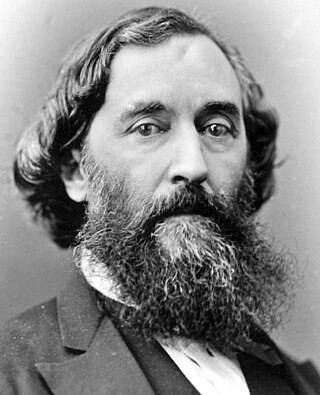
Bartolomé Mitre Martínez was an Argentine statesman, soldier and author. He was President of Argentina from 1862 to 1868 and the first president of unified Argentina.

Alejo Julio Argentino Roca Paz was an army general and statesman who served as President of Argentina from 1880 to 1886 and from 1898 to 1904. Roca is the most important representative of the Generation of '80 and is known for directing the Conquest of the Desert, a series of military campaigns against the indigenous peoples of Patagonia sometimes considered a genocide.

José Félix Evaristo de Uriburu y Álvarez de Arenales was President of Argentina from 23 January 1895 to 12 October 1898.

The fourteenth edition of the South American Championship of football was held in Buenos Aires, Argentina from 27 December 1936 to 1 February 1937.

The nineteenth edition of the South American Championship in football was held in Buenos Aires, Argentina from 12 January to 10 February. This tournament, an extra edition with no trophy handed to the winners, is considered official by CONMEBOL.

Trenes de Buenos Aires (TBA) (In English: Trains of Buenos Aires) was a private company that operated commuter rail services over the 5 ft 6 in (1,676 mm) broad gauge Sarmiento and Mitre lines of Buenos Aires. The company, owned by Claudio and Mario Cirigliano, also operated long-distance services on the General Mitre Railway to central-western Argentina and on the General Urquiza Railway to northern Argentina and Uruguay on the international Tren de los Pueblos Libres.
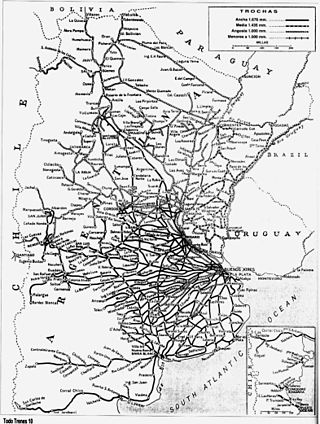
The Argentine railway network consisted of a 47,000 km (29,204 mi) network at the end of the Second World War and was, in its time, one of the most extensive and prosperous in the world. However, with the increase in highway construction, there followed a sharp decline in railway profitability, leading to the break-up in 1993 of Ferrocarriles Argentinos (FA), the state railroad corporation. During the period following privatisation, private and provincial railway companies were created and resurrected some of the major passenger routes that FA once operated.
There are many landmarks in Buenos Aires, Argentina, some of which are of considerable historical or artistic interest.

The Benavídez rail disaster, which occurred on February 1, 1970, is the worst-ever rail disaster in Argentina and South America, leaving 236 dead and more than 500 injured.

Ángel Pacheco, was an Argentine military officer trained by José de San Martín who later became one of the top commanders in the Confederacy during the dictatorship of Juan Manuel de Rosas. He never lost a battle in which he was in command.

Sol Líneas Aéreas Flight 5428 was a passenger flight which crashed near Los Menucos, Argentina, on 18 May 2011, killing all 22 people on board. The aircraft involved, a Saab 340, was operating Sol Líneas Aéreas' scheduled domestic service from Neuquén to Comodoro Rivadavia.
On May 18, 2005, Major Patricio Cereceda of the Chilean Army ordered 474 conscripts from the 17th Regiment of Los Ángeles to march 28 km along the side of the Antuco Volcano at altitudes between 1,400 metres (4,600 ft) and 1,700 metres (5,600 ft). The march took place despite warnings from sergeants and corporals who requested the exercise be canceled due to deteriorating weather conditions. Major Cereceda remained at a military mountain shelter during the march.
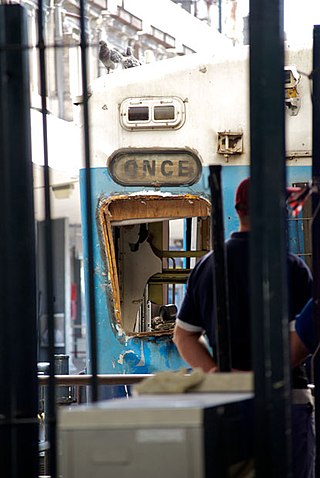
The 2012 Buenos Aires rail disaster, also known as the Once Tragedy, occurred on 22 February 2012, when a train crashed at Once Station in the Balvanera neighbourhood of Buenos Aires, Argentina.

The 2011 Flores rail crash occurred at 06.23 ART on 13 September 2011 when a bus on a level crossing at Flores railway station, in the Flores barrio of Buenos Aires, Argentina, was hit by a train on the Sarmiento Line, heading for Moreno. The accident caused that same train to collide into another one as it derailed.

The Brandsen rail disaster occurred on March 8, 1981, in Brandsen, a town in Buenos Aires Province in Argentina, when a passenger train carrying 803 passengers collided head-on with a freight train, killing 34 and injuring another 74. The train crash was caused by points failure.

José de San Martín is the national hero of Argentina, Chile and Peru, and along with Simón Bolívar, the most important Libertador of the Spanish American Wars of Independence. For this reason, he is paid homage and depicted in several cultural works of those countries, and even internationally. He led the Campaign across the Andes from Argentina to Chile which has been studied around the world for its complexity.
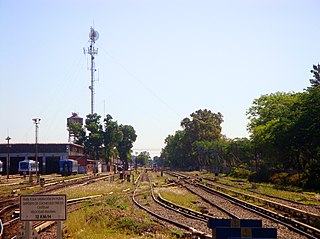
The 2013 Castelar rail disaster occurred on 13 June 2013 at about 07:30 local time, in the Castelar neighborhood of Morón Partido in Greater Buenos Aires area, about 30km west of the city of Buenos Aires, Argentina.
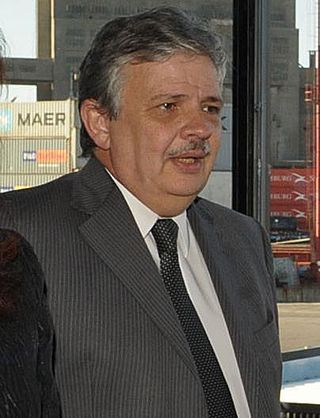
Juan Pablo Schiavi is an Argentine agronomist and politician who has held a wide range of positions at the top of national and municipal government of Argentina.


















